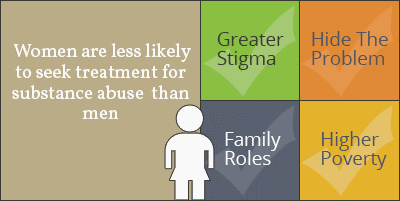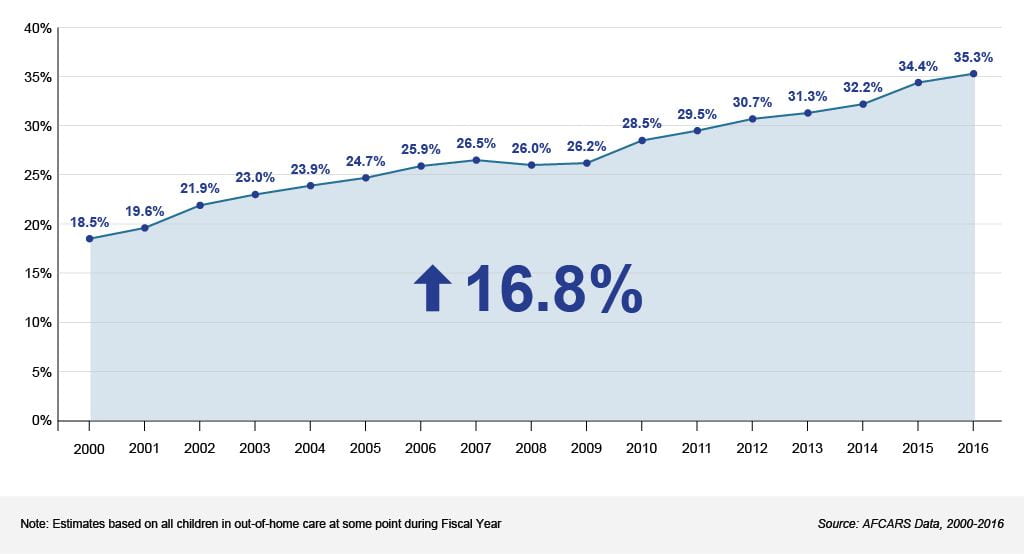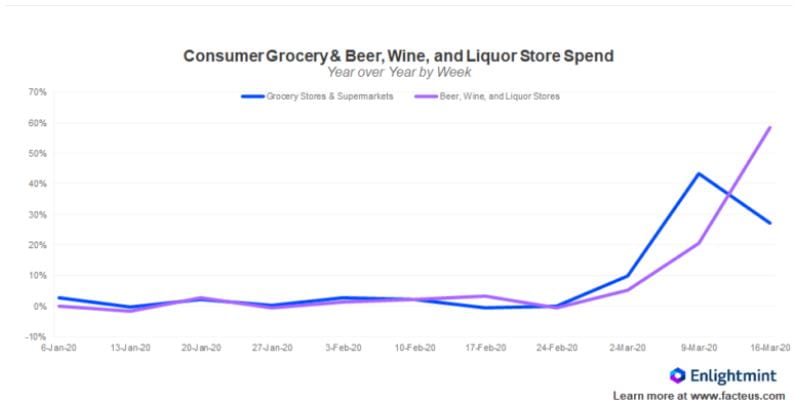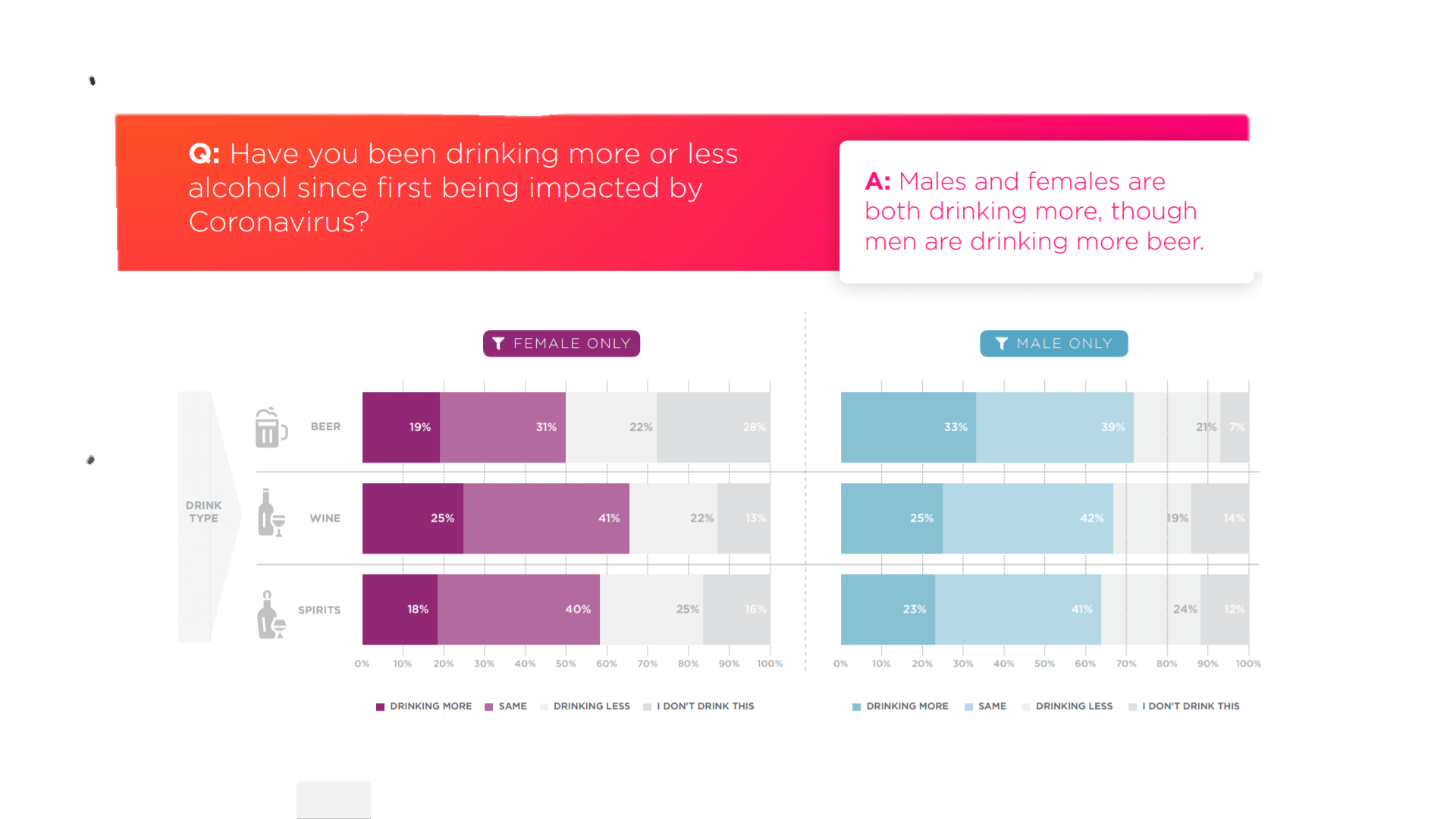Alcohol addiction is one of the leading causes of illness, disability, and premature death in the U.S. Almost 30% of U.S. citizens will suffer alcohol abuse problems in their lives but only one in five people will access any form of treatment (1).Thus, only about 20% of the individuals who need substance abuse treatment can access it (4).
Alcohol abuse is characterized by a low incidence of affected drinkers seeking treatment, especially when they are women (3). Women face several specific barriers to accessing treatment, particularly concerning stigma, child care and financial issues.

Source:https://www.psychiatryadvisor.com/home/topics/addiction/adult-children-of-alcoholics-healing-lifelong-scars/
Several studies have evidenced gender differences in the type, strength, and number of barriers people encounter while considering and attempting to access treatment. For example, in 2005, an article demonstrated that women are more likely than men to experience economic barriers while seeking treatment because they may be less educated and earn lower wages(4) . Additionally, women are more likely to have more trouble finding time to attend therapy due to family responsibilities and transportation issues. Furthermore, women may lack the support of family and friends to enter treatment, so they face more discrimination and stigma for their addictions (4). While men and women face discrimination associated with seeking treatment, women are more susceptible to feeling stigmatized (6).
Identifying and resolving common barriers to women accessing treatment is essential since they experience more health-related consequences of alcohol abuse and alcohol-related problems which interfere more with the functioning in different areas of life compared to men (5). However, being responsible for the care of dependent children is one of the primary and most significant barriers for women to access treatment due to the impact this could have on the family nucleus, especially on children. (13). Previous research has shown that children living with alcoholic parents are at increased risk for anxiety disorders, depression, problems with cognitive and verbal skills, and parental abuse or neglect. Additionally, they are four times more likely than other children to develop alcohol use disorder symptoms (12).
Thus, the concurrence of alcohol abuse and parenting should be recognized as a significant public health problem that has to be evaluated more because a mother suffering from substance abuse significantly affects the well-being of children and their families (12).
The National Survey on Drug Use and Health data has estimated that approximately 7.5 million children have lived in households with at least one parent who has an alcohol use disorder. Among children with single mothers, 1.1 million children have lived with a mother who has an alcohol use disorder (12).
Because there are millions of children living with an alcohol-abused mother, removing barriers is essential for mothers to seek treatment to lessen the impact on families, especially on children. Unfortunately, several other studies have mentioned that the responsibility of caring for children is still considered a substantial and primary barrier to seeking treatment, especially among women (8). In fact, a 2015 survey showed that 73.3% of women responded that they were afraid to ask for help and lose their children due to the possibility of being identified as addicts (10).
The survey shows that fear of losing custody of their children is still a critical barrier for mothers seeking treatment.Sadly, very little has been done to remove this barrier, as the Child Welfare Workers report shows that more and more children with parents who have an alcohol or substance abuse disorder receive care outside the home (foster care). This chart demonstrates that substance abuse among parents is a worrying factor that has contributed to the increase in the relocation of children in foster care from 18% to over 35% in the past 16 years (12).
This graph indicates that every year more women who suffer from substance disorders are losing custody of their children. The lack of government interest in increasing treatment programs with child care services translates into an increasing number of children entering the foster care system. This problem perpetuates the barrier of accessing adequate treatment and affects recovery time, which could be significantly improved if mothers could have the custody of their children. In fact, the “Substance Abuse Treatment Journal” found that in-patient treatment programs, designed for mothers with substance addiction and their children, had positive results. The study evaluated a residential drug rehabilitation program for around 40 women and their children. The program addressed issues of addiction and parenting among women. When women completed the treatment, the severity of their addiction reduced, they scored better on parental stress levels, and their children scored better on behavioral and emotional functioning. The study concluded that “residential treatment has great benefits for mothers and their children,” an outlook that is incredibly promising and optimistic for a mother who has suffered from alcohol use disorders (14). Thus, many studies have corroborated that women whose children stayed with them in specialized rehabilitation programs have had a better retention rate and results (2).
Another study demonstrated the importance of the mother-child connection for women starting and staying in the rehabilitation program. The study surveyed 1,500 people who had a history of substance abuse. The survey asked what was their biggest motivation to stop using addictive substances. The women overwhelmingly replied that they were their children. The men mentioned several people, but the percentages were not as significant. (11).
Therefore, it is essential to broaden and innovate the gender-specific programs that primarily address barriers related to parenting issues of woman with substance abuse. The goal of increasing mother-specific treatment programs is to motivate women to start their treatment and improve retention rates, and eventually to improve psychological and health outcomes for themselves and their children. Reintegrating mother and child into the community with better rehabilitation programs will eventually pay off through savings in foster care, emergency room visits, medical and psychiatric care, income, repeated detoxification, incarcerations, and children’s special education needs. For women with an alcohol use disorder, increasing access to treatment and improving mothers’ roles can positively impact the well-being of women, children, and the society.
References:
1.-https://www.recoveryanswers.org/research-post/what-are-barriers-to-seeking-alcohol-treatment/
2.- https://www.ncbi.nlm.nih.gov/books/NBK83257/
3.- https://www.ncbi.nlm.nih.gov/pmc/articles/PMC4630073/
4.- https://americanaddictioncenters.org/rehab-guide/treatment-barriers
5.-https://pubs.niaaa.nih.gov/publications/arh291/55-62.htm
7.-https://pubmed.ncbi.nlm.nih.gov/16767855/
8.-https://www.hazeldenbettyford.org/education/bcr/addiction-research/women-alcohol-ru-1217
9.https://americanaddictioncenters.org/co-occurring-disorders/in-women
10.-https://americanaddictioncenters.org/rehab-guide/with-children
11.-https://deserthopetreatment.com/addiction-guide/substance-abuse/substance-abuse-by-gender/
12.-https://www.samhsa.gov/data/sites/default/files/report_3223/ShortReport-3223.html
13.-https://www.ncbi.nlm.nih.gov/books/NBK83238/
14.https://americanaddictioncenters.org/rehab-guide/with-children











